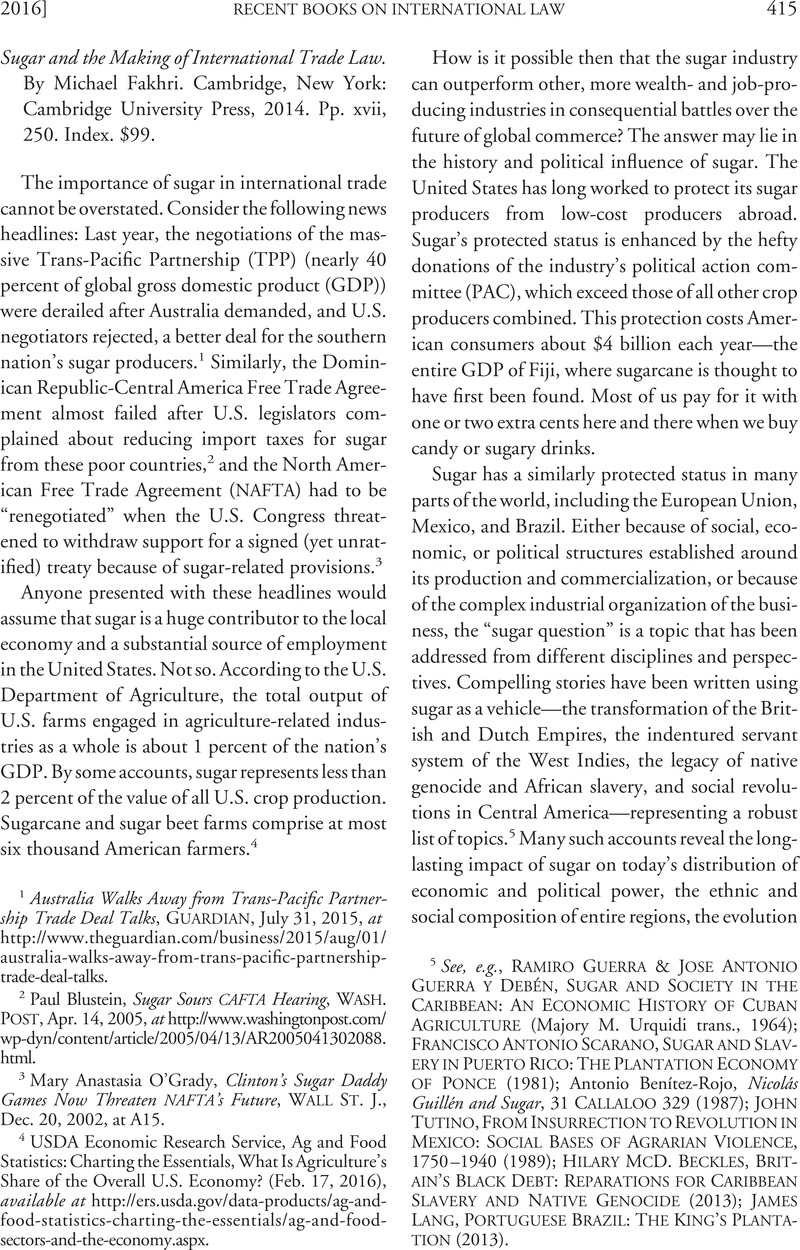No CrossRef data available.
Published online by Cambridge University Press: 20 January 2017

1 Australia Walks Away from Trans-Pacific Partnership Trade Deal Talks, Guardian, July 31, 2015, at http://www.theguardian.com/business/2015/aug/01/australia-walks-away-from-trans-pacific-partnership-trade-deal-talks.
2 Paul Blustein, Sugar Sours CAFTA Hearing, Wash. Post, Apr. 14, 2005, at http://www.washingtonpost.com/wp-dyn/content/article/2005/04/13/AR2005041302088.html.
3 O’Grady, Mary Anastasia, Clinton’s Sugar Daddy Games Now Threaten NAFTA’s Future, Wall St. J., Dec. 20, 2002, at A15 Google Scholar.
4 USDA Economic Research Service, Ag and Food Statistics: Charting the Essentials, What Is Agriculture’s Share of the Overall U.S. Economy? (Feb. 17, 2016), available at http://ers.usda.gov/data-products/ag-and-food-statistics-charting-the-essentials/ag-and-food-sectors-and-the-economy.aspx.
5 See, e.g., Ramiro Guerra & Jose Antonio Guerra Y Debén, Sugar and Society in the Caribbean: An Economic History of Cuban Agriculture (Majory M. Urquidi trans., 1964); Francisco Antonio Scarano, Sugar and Slavery in Puerto RICO:The Plantation Economy of Ponce (1981); Antonio Benítez-Rojo, Nicolás Guillén and Sugar, 31 Callaloo 329 (1987); John Tutino, From Insurrection to Revolution in Mexico:Social Bases of Agrarian Violence, 1750–1940 (1989); Hilary McD. Beckles, Britain’s Black Debt: Reparations for Caribbean Slavery and Native Genocide (2013); James Lang, Portuguese Brazil:The King’s Plantation (2013).
6 Brussels Sugar Convention, 95 Brit. & Foreign State Papers 6 (1902) (in French), abrogated, Sept. 1, 1920, 1 LNTS 400 (1920).
7 Sidney W. Mintz, Sweetness and Power: The Place of Sugar in Modern History 51–53 (1985).
8 See James Brown Scott, The Hague Peace Conferences of 1899 and 1907 (1909).
9 See James, Clifford L., International Control of Raw Sugar Supplies, 21 Am. Econ. Rev. 481, 486 n.14 (1931)Google Scholar (in part discussing the Chadbourne Agreement of 1931, a trading arrangement “applied to the beet and cane sugar producers of the continental United States and the cane sugar producers of the territorial United States—Philippines, Hawaii, and Porto Rico”); see also Wheeler, Leslie A., Agricultural Surpluses in the Postwar World, 20 Foreign Aff. 87, 92 (1941)CrossRefGoogle Scholar.
10 For example, Article 11.1(b) of the 1994 Agreement on Safeguards prohibits any WTO member from seeking, taking, or maintaining “any voluntary export restraints, orderly marketing arrangements or any similar measure on the export or import side.” Agreement on Safeguards, Art. 11.1(b), Apr. 15, 1994, Marrakesh Agreement Establishing the World Trade Organization, Annex 1A, in World Trade Organization, The Results of the Uruguay Round of Multilateral Trade Negotiations:The Legal Texts 315 (1999), available at https://www.wto.org/english/docs_e/legal_e/25-safeg_e.htm.
11 Antony Anghie, Imperialism, Sovereignty and the Making of International Law (2007); see also Arnulf Becker Lorca, Mestizo International Law:A Global Intellectual History 1842–1933 (2015).
12 Gathii, James Thuo, TWAIL: A Brief History of Its Origins, Its Decentralized Network, and a Tentative Bibliography, 3 Trade L. & Dev. 26 (2011)Google Scholar.
13 Cf. Henry Christopher Wallich, Monetary Problems of an Export Economy:The Cuban Experience, 1914–1947, at 3, 20, 171–73 (1950) (attributing the “exceptional performance” of the Cuban economy prior to the 1940s to the sugar industries predating 1925, but also pointing to the perils of the exclusive reliance on a single commodity).
14 For a seminal account on this artificial separation, see Polanyi, Karl, The Economy as Instituted Process, in Trade and Market in the Early Empires: Economies in History and Theory 243 (Polanyi, Karl, Arensberg, Conrad M. & Pearson, Harry W. eds., 1957)Google Scholar.
15 Pirrong, Stephen Craig, The Self-Regulation of Commodity Exchanges: The Case of Market Manipulation, 38 J.L. & Econ. 141 (1995)CrossRefGoogle Scholar.
16 Cf. Pauwelyn, Joost, The Transformation of World Trade, 104 Mich. L. Rev. 1 (2005)Google Scholar (recounting a gradual transformation of the world trade system as the result of GATT’s bidirectional interaction between law and politics).
17 Shaffer, Greg, How the World Trade Organization Shapes Regulatory Governance, 9 Reg. & Governance 1 (2015)CrossRefGoogle Scholar.
18 Frank Newbould, Poster: Reaping Sugar-Canes in the West Indies (c.1930), available at http://www.sotherans.co.uk/Catalogue.php?stk=2088908&cat=posters15&type%5B%5D=prints.